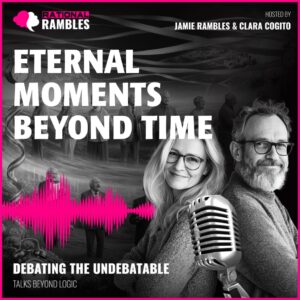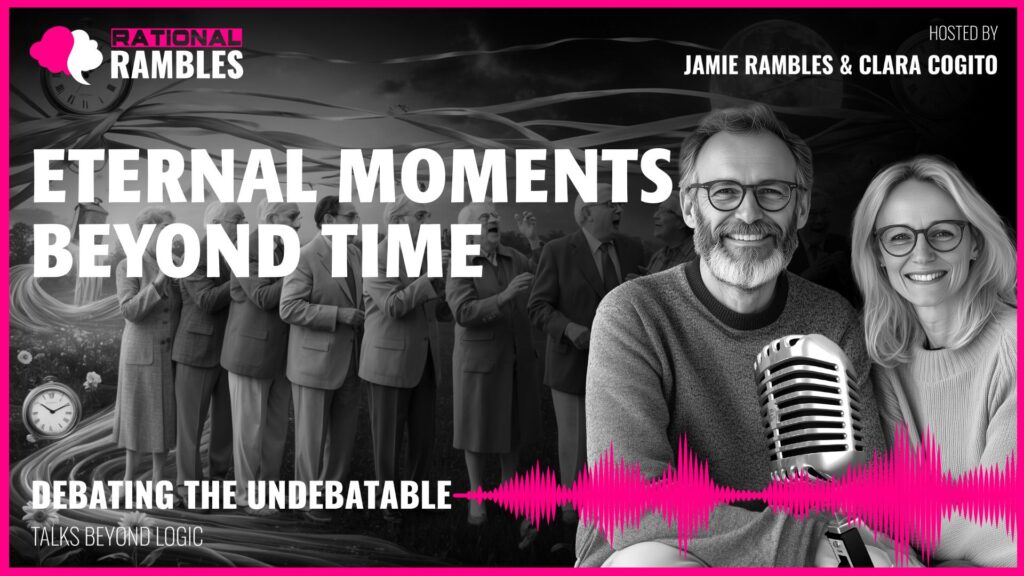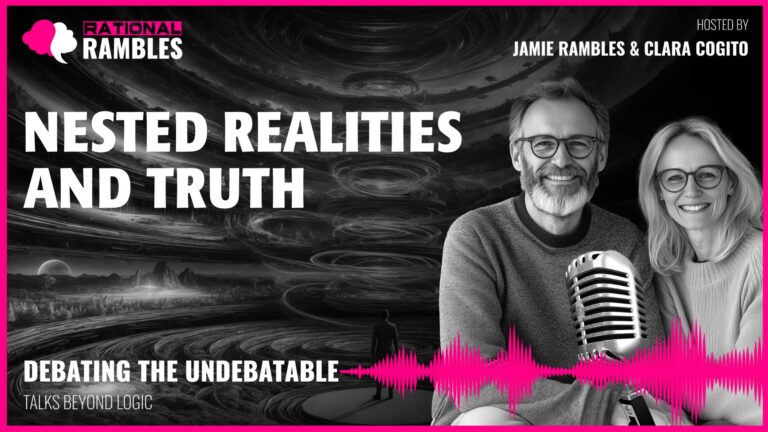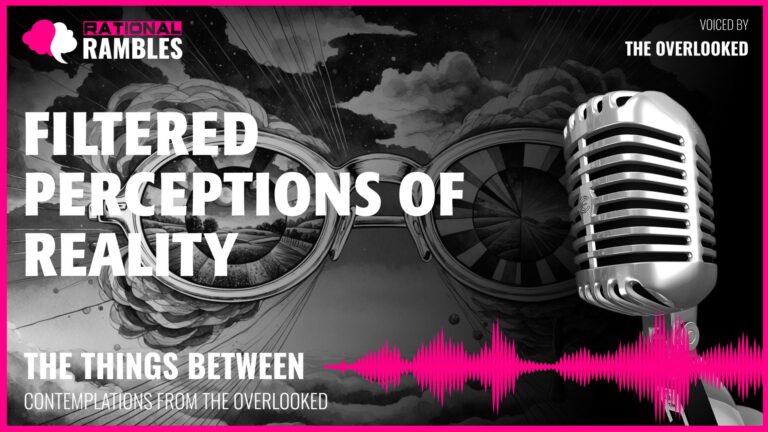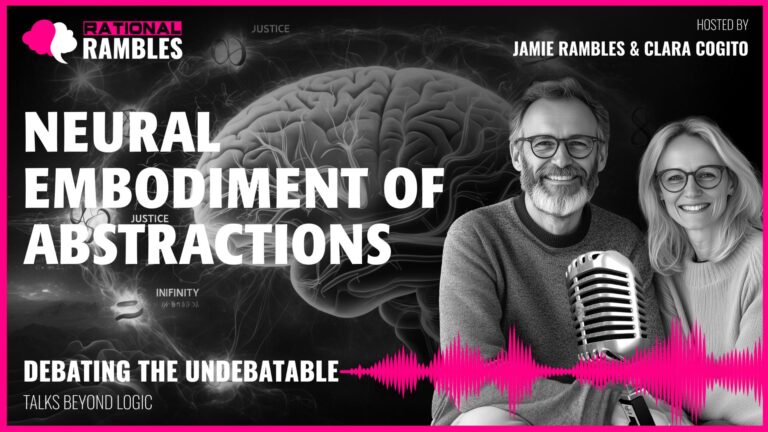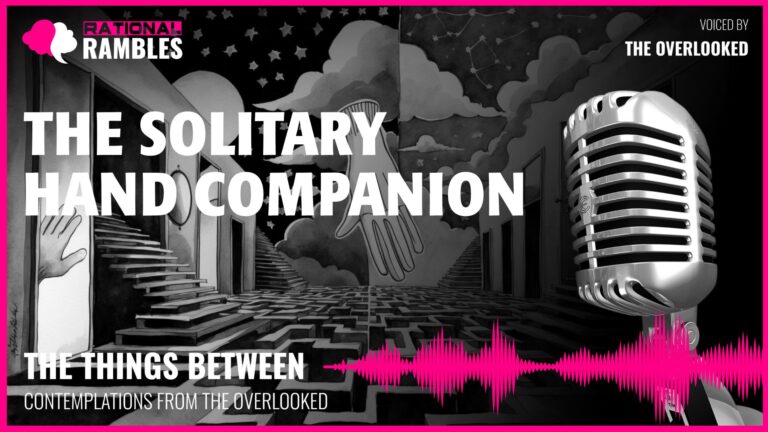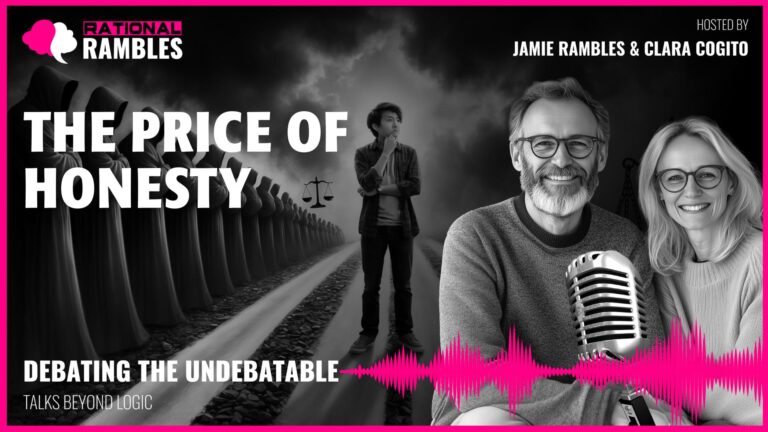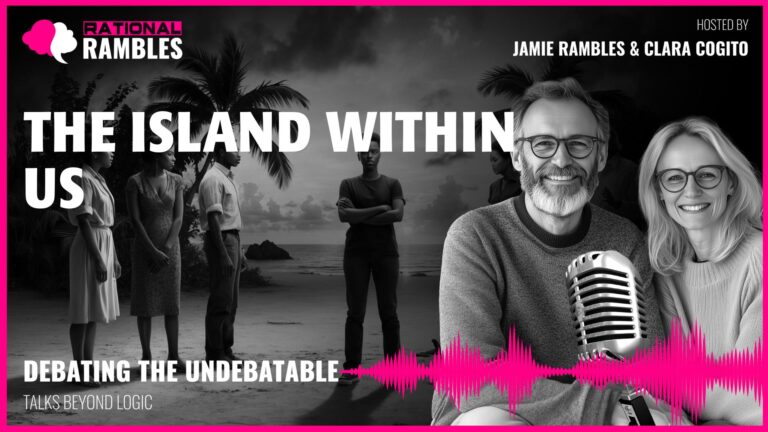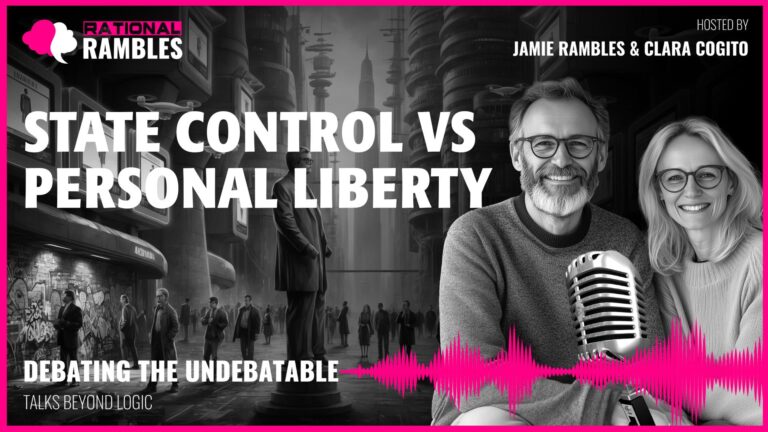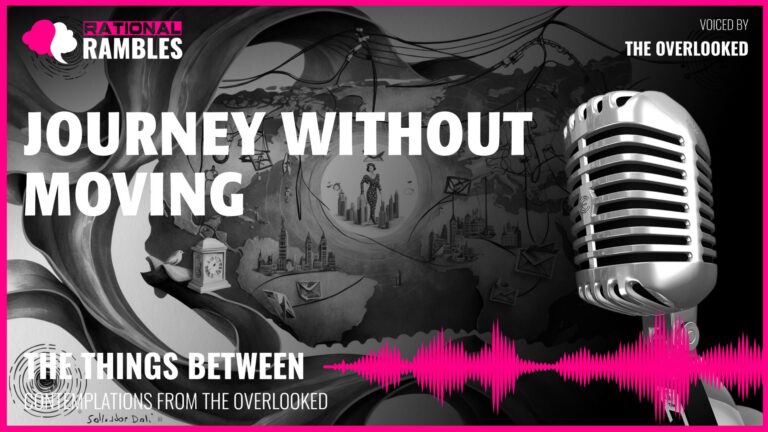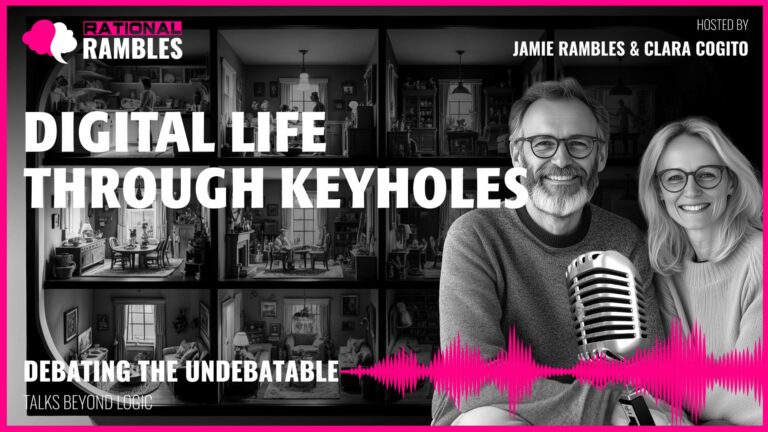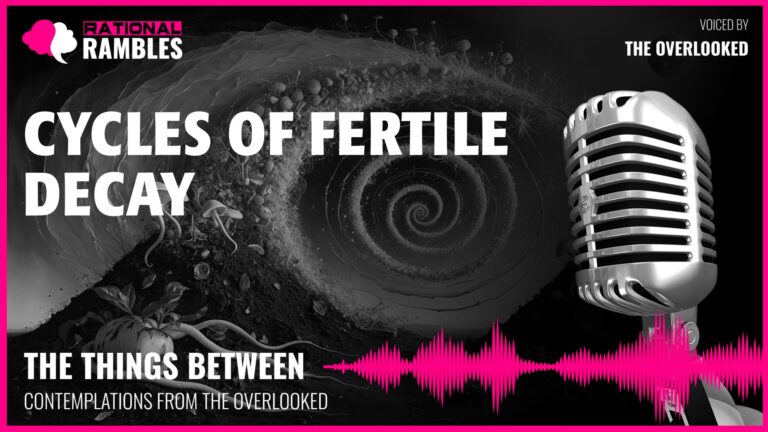Eternal Moments Beyond Time: The Illusion of Temporal Reality
Introduction: Time’s Paradoxical Nature
What if every moment of your existence—past, present, and future—exists simultaneously and eternally? This mind-bending proposition challenges our most fundamental understanding of reality and consciousness. Like frames in a film reel that all exist at once rather than sequentially, our lives may be complete, eternal artifacts rather than works-in-progress unfolding through time. This concept, far from being merely speculative, connects profound philosophical traditions with cutting-edge physics and psychological research, suggesting that our perception of time flowing from past to future may be what Einstein called a “stubbornly persistent illusion.”
The nature of time has perplexed humanity’s greatest thinkers for millennia. Augustine of Hippo famously noted the paradox that while we speak confidently about time in everyday discourse, when asked to explain what time actually is, we struggle immensely. This article explores the philosophical concept of eternalism (also known as the “block universe” theory), which proposes that past, present, and future moments are equally real and exist simultaneously, with our experience of temporal flow being a construct of consciousness rather than a fundamental feature of reality.
By examining this perspective through multiple lenses—from theoretical physics to developmental psychology, from Eastern contemplative traditions to Western philosophical frameworks—we will confront profound questions about causality, identity, free will, and the meaning of existence. If all moments exist eternally, what becomes of our sense of self, our moral responsibility, and our understanding of death? How might this perspective transform our approach to life, suffering, and fulfillment?
Philosophical Frameworks: Eternalism and Temporal Experience
The concept that all moments exist simultaneously finds its formal philosophical expression in what philosophers call the “B-theory of time” or “eternalism.” This perspective stands in contrast to the “A-theory” or “presentism,” which holds that only the present moment is real, with past moments having ceased to exist and future moments not yet existing. The distinction between these competing views was famously articulated by J.M.E. McTaggart, who distinguished between the “A-series” of time—organized around the constantly shifting designations of past, present, and future—and the “B-series”—organized around the fixed relations of before, after, and simultaneous with.
According to eternalism, the passage of time is not an objective feature of reality but a subjective experience. All events—whether we conventionally label them “past,” “present,” or “future”—exist with equal reality in a four-dimensional spacetime manifold. This view aligns with Einstein’s special and general theories of relativity, which revealed that there is no universal “now” moment spanning the cosmos. Events that appear simultaneous to one observer may appear sequential to another observer in a different reference frame, suggesting that temporal relationships are relative rather than absolute.
Historical Perspectives on Time’s Illusory Nature
The suspicion that time might be illusory has ancient roots. Parmenides, a pre-Socratic Greek philosopher, argued against the reality of change, suggesting that what truly exists must be unchanging and eternal. Plato, influenced by Parmenides, considered the temporal world to be a mere shadow of eternal Forms. In Eastern philosophical traditions, particularly Buddhism and Advaita Vedanta, time is often characterized as a construct of mind rather than an ultimate reality.
Immanuel Kant took a revolutionary approach by proposing that time is not a feature of reality itself but rather a necessary structure of human cognition—what he called a “form of intuition.” According to Kant, we do not perceive time; rather, time is part of the perceptual apparatus through which we experience the world. This perspective prefigured contemporary psychological understandings of time as a mental construct rather than a direct perception.
Friedrich Nietzsche’s concept of “eternal recurrence”—the hypothetical idea that the universe and all existence recurs infinitely across time and space—represents another approach to temporality that challenges linear conceptions. While differing from eternalism in its cyclical nature, Nietzsche’s concept similarly disrupts conventional understandings of time and confronts us with the weight of eternity.
Modern Physics and the Block Universe
Einstein’s theories of relativity fundamentally transformed our understanding of time, revealing it to be interwoven with space in a four-dimensional continuum called spacetime. The mathematical formalism of relativity treats time as another dimension analogous to the three dimensions of space, leading many physicists to adopt the “block universe” interpretation in which all points in time exist simultaneously.
As Einstein himself wrote in a letter of condolence following the death of his friend Michele Besso: “Now he has departed from this strange world a little ahead of me. That means nothing. People like us, who believe in physics, know that the distinction between past, present, and future is only a stubbornly persistent illusion.”
Contemporary theoretical physics continues to challenge intuitive notions of time. Quantum mechanics introduces further complications through phenomena like quantum entanglement, which suggests instantaneous connections between particles regardless of spatial separation—potentially undermining temporal causality. Some interpretations of quantum mechanics, such as the many-worlds interpretation, propose that all possible futures exist simultaneously in branching realities, further complicating traditional conceptions of temporal progression.
Psychological Dimensions: How We Construct Temporal Experience
From a neuropsychological perspective, our experience of time is manifestly a construction of the brain rather than a direct perception of an external reality. Unlike our five basic senses, we have no dedicated “time organ.” Instead, temporal awareness emerges from the integration of multiple neural systems and cognitive processes. This constructed nature of temporal experience aligns with the philosophical possibility that time’s apparent flow may be illusory.
Research in cognitive neuroscience reveals that our brains process temporal information in complex ways that often diverge from objective measurements of duration. For instance, our perception of time slows during threatening or emotionally intense situations—a phenomenon known as “time dilation.” Conversely, routine or pleasant activities often seem to pass quickly. If time were an objective feature of reality rather than a subjective experience, would it be so variable?
Developmental Perspectives on Temporal Consciousness
Our relationship with time evolves dramatically throughout the lifespan, suggesting its constructed nature. Young children live primarily in what developmental psychologists call an “extended present.” They struggle with concepts like “yesterday” and “tomorrow,” and their autobiographical memories lack temporal organization. As cognitive development progresses, children gradually acquire increasingly sophisticated temporal concepts and the ability to mentally project themselves into past and future scenarios—a capacity known as “mental time travel.”
Piaget identified the development of temporal understanding as a key aspect of cognitive maturation. Children progress from an egocentric temporal perspective focused on the immediate present to an increasingly decentered understanding that incorporates abstract temporal concepts and recognition of different temporal perspectives. This developmental trajectory suggests that our mature understanding of linear, flowing time may be something we learn rather than an innate understanding of reality.
As we age further, our subjective experience of time continues to change. Many older adults report that time seems to pass more quickly than it did in their youth—a phenomenon that may relate to the relative proportion of lived experience that new events represent, or to changes in attentional processes. These developmental changes in temporal perception support the view that time experience is fundamentally psychological rather than reflecting direct access to an objective temporal reality.
Altered States and Temporal Disruptions
Certain states of consciousness—including deep meditation, flow states, psychedelic experiences, and some neurological conditions—can dramatically transform temporal experience, sometimes creating the sense of an “eternal now” where past and future collapse into an expanded present. These altered states provide intriguing windows into alternative ways of experiencing reality that transcend ordinary temporal boundaries.
Patients with specific neurological conditions experience radical disruptions of normal temporal processing. For example, individuals with anterograde amnesia cannot form new autobiographical memories, resulting in an experience perpetually trapped in what feels like an extended present. Some patients with specific brain injuries lose the ability to understand cause-and-effect relationships, resulting in a fragmentary, disjointed experience lacking the narrative coherence that typically structures our temporal understanding.
Research on mindfulness meditation has documented how trained practitioners can cultivate states of awareness in which temporal passage is experienced differently—with greater presence in the moment and less preoccupation with past and future. These practices, derived from contemplative traditions that view time as ultimately illusory, produce measurable changes in attention, perception, and neural activity, suggesting that we can systematically transform our relationship with temporal experience through specific mental training.
Identity and Selfhood Beyond Time
If all moments exist eternally and simultaneously, profound questions arise about the nature of personal identity. Our conventional sense of self depends heavily on autobiographical memory and temporal continuity—we define ourselves through narratives that are fundamentally temporal: “I am the person who experienced X, learned Y, and will pursue Z.” If time is illusory, does our sense of continuous identity dissolve into discrete eternal moments?
This question connects to philosophical debates about personal identity through time. Some philosophers, like Derek Parfit, have proposed that the self is better understood as a series of connected “person-stages” rather than as a continuous entity. Parfit’s view suggests that what matters is psychological continuity and connectedness between these stages, not some underlying metaphysical essence that persists unchanged through time.
The No-Self Perspective
Buddhist philosophy advances the concept of “anatta” or “no-self”—the idea that what we experience as a continuous self is actually a collection of processes and experiences without an underlying essence. According to this view, the sense of being a continuous entity moving through time is a fundamental delusion that causes suffering. Through meditative practice, one can directly experience the constructed and impermanent nature of the self.
Research on long-term meditation practitioners shows they often report experiences consistent with this view—moments where the usual sense of being a continuous self temporarily dissolves. Neuroscientific studies have identified decreased activity in brain networks associated with self-referential processing during these states. Interestingly, these experiences of “selflessness” are typically described as liberating rather than frightening, suggesting we might be psychologically capable of relating to identity in radically different ways.
The dissolution of a time-bound identity need not lead to nihilism or meaninglessness. Many contemplative traditions suggest that transcending the limited, temporal self opens the possibility of connecting with a more fundamental dimension of existence—variously characterized as Buddha-nature, True Self, or simply awareness itself. This dimension is described as timeless, boundless, and inherently peaceful, suggesting that the realization of time’s illusory nature might be liberating rather than disturbing.
Narrative Identity and Meaning
From a psychological perspective, our sense of self is inseparable from the stories we tell about our lives. Narrative psychologists like Dan McAdams have explored how we construct and revise autobiographical narratives that give coherence and meaning to our experiences across time. These narratives help us make sense of change and continuity, integrate disparate experiences, and derive meaning from life events.
If time is illusory in an ultimate sense, does that undermine the significance of these narratives? Not necessarily. The philosopher Viktor Frankl emphasized that meaning-making remains significant regardless of metaphysical frameworks. Just as a novel’s ending exists simultaneously with its beginning when sitting on a shelf, the meaning emerges through the journey, not despite the predetermined nature of the text.
This perspective suggests a compatibilist approach to identity in an eternal framework—recognizing that meaningful temporal experience and narrative selfhood can exist within an ultimately timeless reality. The sequence and narrative still matter from within the experience, even if from some external perspective all moments simply are.
Causality and Free Will in an Eternal Framework
If all moments exist eternally and simultaneously, what happens to our understanding of causality? Normally we think event A causes event B, but if both already eternally exist, the causal relationship becomes less clear. This question strikes at the heart of how we understand both physical processes and human agency.
Our brains are essentially prediction machines evolved to detect causal relationships—it’s fundamental to how we understand the world. Studies show that even infants have basic expectations about causality. If causality is just another aspect of our time illusion, that would mean our most basic cognitive frameworks are constructed rather than reflecting reality.
Determinism and Choice
The eternalist perspective appears to imply a form of determinism—if all moments of time already exist, including those we conventionally think of as “future,” then there seems to be no room for alternative possibilities or genuine choice. This raises serious questions about free will and moral responsibility. If my future actions already exist eternally, in what sense can I be said to choose them?
Philosophers have developed various responses to this challenge. Compatibilists argue that meaningful choice can exist even within deterministic frameworks. On this view, free will doesn’t require the ability to have done otherwise in an absolute sense; it requires only that our actions flow from our own desires, values, and deliberative processes rather than from external coercion.
Recent developments in physics complicate this picture further. Quantum mechanics introduces fundamental indeterminism at the subatomic level, which some philosophers have suggested might provide a physical basis for genuine choice. However, how quantum indeterminism might translate to macroscopic human decision-making remains unclear, and some interpretations of quantum mechanics are compatible with determinism.
The Experience of Agency
Regardless of the metaphysical status of free will, our subjective experience of agency appears to be psychologically crucial. Research shows that perceived choice and control contribute significantly to psychological well-being, even in situations where choice is actually limited. People who believe they have meaningful agency in their lives report greater satisfaction and demonstrate greater resilience in the face of challenges.
Interestingly, the illusion of choice might be necessary for psychological functioning even if free will is metaphysically problematic. Studies of individuals with certain frontal lobe damage show that when the neural basis of the experience of volition is disrupted, normal functioning becomes virtually impossible despite intact cognitive abilities. This suggests that our sense of agency, whether metaphysically justified or not, is a necessary component of psychological integrity.
This perspective offers another reconciliation between eternalism and human experience: even if all moments exist eternally, our subjective experience of deliberating, choosing, and acting remains significant. The value of choice might lie not in altering some metaphysical future but in the meaning we create through the process of choosing itself.
Cross-Cultural Perspectives on Time and Eternity
Western philosophical discussions of time often neglect the rich diversity of temporal conceptions found across human cultures. Indigenous and non-Western cultures frequently conceptualize time in ways that diverge significantly from the linear, progressive model dominant in contemporary Western thought. These alternative frameworks offer valuable perspectives on the possibility of time’s illusory nature.
Many Aboriginal Australian cultures, for instance, recognize the concept of “Dreamtime” or “The Dreaming”—a spiritual dimension in which past, present, and future coexist. The Dreaming is not merely a creation myth about the distant past but an ongoing reality that continues to influence the present and future. Sacred sites, ritual practices, and ancestral beings exist in a complex temporal relationship that transcends linear chronology.
Circular and Cyclical Time
Numerous cultural traditions conceptualize time as circular or cyclical rather than linear. In Hindu cosmology, time moves through vast cycles (kalpas) of creation and destruction. Mayan cosmology similarly featured recurring cycles of different durations. These cyclical models challenge the notion of irreversible temporal progression and suggest a more complex relationship between past, present, and future than linear models allow.
Even within Western traditions, circular conceptions of time have existed alongside linear ones. Ancient Greek thought included both linear chronos (chronological time) and cyclical kairos (opportune or significant time). Medieval European peasants often experienced time according to natural cycles of seasons and religious calendars rather than as an abstract, uniform progression.
These diverse cultural models remind us that our conventional understanding of time as a linear arrow flowing from past to future represents just one among many possible frameworks for organizing temporal experience. The widespread existence of non-linear temporal conceptions across cultures suggests that the human mind is capable of relating to time in ways that transcend conventional sequentiality.
Eastern Philosophical Perspectives
Eastern philosophical traditions have particularly sophisticated analyses of time and its potentially illusory nature. In Zen Buddhism, there’s the concept of the “eternal now”—where past and future collapse into present awareness. This is not merely a philosophical speculation but something directly realizable through meditation practices.
The Buddhist concept of “shunyata” (emptiness) includes the understanding that all phenomena, including time itself, lack inherent, independent existence. According to this view, what we experience as time emerges dependently from causes and conditions rather than existing as an objective, independent reality. The goal of Buddhist practice includes directly perceiving this empty, dependently arisen nature of time and all phenomena.
Advaita Vedanta, a philosophical school within Hinduism, proposes that ultimate reality (Brahman) is timeless and beyond temporal distinctions. What we experience as time belongs to the realm of maya (illusion) rather than to fundamental reality. Through spiritual practice, one can realize one’s identity with the timeless Brahman rather than with the time-bound individual self (jiva).
These Eastern perspectives offer not just theoretical frameworks but practical methodologies for transforming one’s relationship with time through specific contemplative practices. They suggest that the realization of time’s ultimate illusoriness might be directly accessible through certain forms of consciousness, not merely an abstract philosophical position.
Practical Implications: Living in Light of Eternal Moments
If all moments exist eternally and simultaneously, how might this understanding transform our approach to life? What practical implications follow from recognizing time’s potentially illusory nature? Far from being merely theoretical, this perspective might fundamentally reshape our relationship with mortality, suffering, decision-making, and meaning.
One profound implication concerns our understanding of death. If all moments exist eternally, then birth and death are not absolute beginnings and endings but rather boundaries of our temporal experience—like the first and last pages of a book that exists in its entirety. This doesn’t necessarily diminish the significance of death as a horizon of individual experience, but it might transform how we relate to mortality and loss.
Psychological Applications
Contemporary mindfulness-based therapeutic approaches draw on the insight that excessive preoccupation with past and future contributes to psychological suffering. By cultivating greater presence in the moment, individuals can reduce rumination about the past and anxiety about the future. Research demonstrates that mindfulness practices can effectively treat various psychological conditions, including depression, anxiety, addiction, and chronic pain.
These approaches don’t necessarily require accepting the metaphysical position that time is illusory. However, they do involve temporarily shifting one’s relationship with time—focusing on direct experience in the present moment rather than being absorbed in temporal narratives. The therapeutic efficacy of these approaches suggests there may be psychological value in temporarily loosening our conventional temporal orientation.
Flow states—experiences of complete absorption in an optimally challenging activity—represent another alteration in temporal experience associated with well-being. During flow, self-consciousness recedes and time perception often becomes distorted, with hours sometimes feeling like minutes. Research by Mihaly Csikszentmihalyi shows that people report these states as among their most fulfilling experiences, suggesting again that temporarily transcending ordinary temporal consciousness can enhance well-being.
Ethical Considerations
The eternalist perspective raises complex ethical questions. If all moments exist with equal reality, including those we conventionally think of as “future,” does this undermine moral responsibility? Why strive to create a better future if that future already exists eternally? Why work to prevent suffering if all suffering already eternally exists?
One response points to the difference between temporal and logical relationships. Even if all moments exist eternally, logical relationships of influence remain. My current actions logically influence (rather than temporally cause) what exists at later temporal coordinates. The eternalist perspective doesn’t eliminate the significance of choice but places it within a different metaphysical framework.
Another response emphasizes that moral value exists within temporal experience, regardless of whether that experience reflects ultimate reality. From within our temporal perspective, suffering matters and compassionate action is meaningful. Even if all moments exist eternally, the quality of those moments—their content of joy or suffering, wisdom or ignorance—remains significant.
Some philosophers have even suggested that an eternalist perspective might strengthen rather than weaken ethical motivation by emphasizing that the consequences of our actions have eternal rather than merely temporary existence. If what we do becomes an eternal part of reality rather than something that passes away, this might heighten rather than diminish our sense of responsibility.
The Limits of Understanding: Conceptual Boundaries and Beyond
As we explore the possibility that all moments exist eternally and simultaneously, we inevitably confront the limits of human understanding. Our minds evolved to navigate physical space and sequential time, not to comprehend eternal simultaneity. It’s like asking fish to understand drought—we’re bumping against the limitations of mental machinery designed for very different purposes.
This challenge is compounded by the limitations of language, which is inherently sequential and temporal. Even describing “eternal moments” requires temporal terms. The linear nature of language makes it poorly suited for expressing non-linear temporal realities. As Ludwig Wittgenstein famously remarked, “Whereof one cannot speak, thereof one must be silent.” Perhaps the eternal simultaneous nature of all moments is something we can point toward philosophically but never fully articulate within language.
Beyond Conceptual Understanding
These limitations suggest that relating to time’s true nature might require something beyond conceptual understanding. Many contemplative traditions emphasize direct experiential realization rather than intellectual comprehension when it comes to ultimate questions about reality, consciousness, and time. Practices such as meditation aim to cultivate states of awareness in which one can directly apprehend realities that transcend conceptual frameworks.
This approach aligns with what philosopher Thomas Nagel explored in his famous essay “What Is It Like to Be a Bat?” Nagel argued that there are fundamental limitations to what we can understand about experiences radically different from our own. To truly understand reality outside of time might require a form of consciousness fundamentally different from our own—perhaps one accessible through contemplative practices or altered states.
In psychological healing as well, sometimes the most significant transformations come not through logical understanding but through a felt sense that transcends our normal ways of knowing. Therapies addressing trauma, for instance, often work at the level of embodied experience rather than just cognitive comprehension, recognizing that some forms of knowing transcend verbal articulation.
The Value of Multiple Perspectives
Given these limitations, perhaps the most fruitful approach involves holding multiple perspectives simultaneously—recognizing both the potential illusoriness of time from an ultimate standpoint and the undeniable reality of temporal experience from our embodied, human perspective. This multi-perspective approach allows us to explore profound metaphysical questions while remaining grounded in lived experience.
By bringing together insights from theoretical physics, phenomenological philosophy, developmental psychology, contemplative traditions, and diverse cultural frameworks, we can develop a richer understanding of time’s paradoxical nature. Each perspective offers unique insights that, taken together, might bring us closer to understanding what ultimately may transcend complete understanding.
The physicist Niels Bohr suggested that profound truths are recognized by the fact that their opposites are also profound truths. Perhaps time is both fundamentally illusory and experientially real—a paradox that points toward a deeper reality beyond the conceptual dichotomies of our ordinary understanding.
Conclusion: Embracing the Paradox
As we conclude our exploration of the possibility that all moments exist eternally and simultaneously, we are left not with definitive answers but with expanded perspectives on what it means to exist as temporal beings, possibly within an eternal reality. The question of whether time is ultimately real or illusory may not be definitively answerable within the constraints of human cognition and language. Yet engaging with this question transforms our understanding of consciousness, identity, meaning, and the very structure of experience.
If time is indeed illusory in some ultimate sense, this need not lead to nihilism or despair. Rather, it might open new possibilities for relating to existence—with greater presence, reduced attachment to fixed narratives, and deeper appreciation for the mystery of being. Like a novel whose ending exists simultaneously with its beginning when sitting on a shelf, the meaning of our lives might emerge not despite but through the journey of temporal experience.
Perhaps what makes human existence meaningful is precisely this paradoxical position—existing simultaneously within time and eternity, experiencing the flow of moments while intuiting their ultimate simultaneity. As T.S. Eliot wrote in “Four Quartets,” a poetic exploration of time and eternity: “We shall not cease from exploration, and the end of all our exploring will be to arrive where we started and know the place for the first time.”
This exploration of eternal moments beyond time invites us not to abandon our temporal experience but to hold it more lightly—to recognize both its constructed nature and its undeniable significance, to live fully within the apparent flow of time while remaining open to glimpses of the eternal now that may underlie it. In embracing this paradox, we might discover new dimensions of meaning, consciousness, and connection that transcend our conventional temporal frameworks while remaining grounded in the embodied wisdom of human experience.
References and Further Reading
Barbour, J. (1999). The End of Time: The Next Revolution in Physics. Oxford University Press.
Csikszentmihalyi, M. (1990). Flow: The Psychology of Optimal Experience. Harper & Row.
Kabat-Zinn, J. (2013). Full Catastrophe Living: Using the Wisdom of Your Body and Mind to Face Stress, Pain, and Illness. Bantam Books.
McTaggart, J.M.E. (1908). The Unreality of Time. Mind, 17(68), 457-474.
Nagel, T. (1974). What Is It Like to Be a Bat? The Philosophical Review, 83(4), 435-450.
Parfit, D. (1984). Reasons and Persons. Oxford University Press.
Price, H. (1996). Time’s Arrow and Archimedes’ Point: New Directions for the Physics of Time. Oxford University Press.
Varela, F.J., Thompson, E., & Rosch, E. (1991). The Embodied Mind: Cognitive Science and Human Experience. MIT Press.
Wallace, B.A. (2012). Meditations of a Buddhist Skeptic: A Manifesto for the Mind Sciences and Contemplative Practice. Columbia University Press.
Zahavi, D. (2005). Subjectivity and Selfhood: Investigating the First-Person Perspective. MIT Press.


